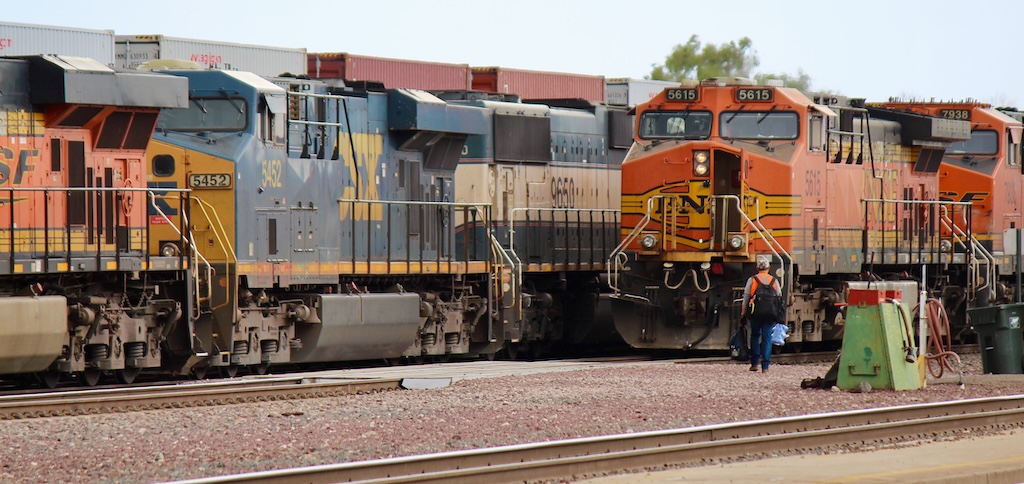
BNSF Railway and CSX today announced an intermodal partnership that will offer seamless domestic coast-to-coast service, plus new international service linking BNSF’s Kansas City terminal with CSX-served ports on the East Coast.
The move comes little more than three weeks after Union Pacific and Norfolk Southern unveiled their plans to merge into the first U.S. transcontinental railroad. But a CSX spokesman said the railroads had been working on the intermodal agreement for months.
BNSF and CSX said they would introduce direct domestic intermodal service between Southern California and Charlotte, N.C., and Jacksonville, Fla. Service also will be launched between Phoenix and Atlanta.
The seamless service, the railroads said, will aim to convert over-the-road freight to rail.
To support the new service, BNSF will add two new 10,000-foot passing sidings between Phoenix and Flagstaff, Ariz., near the junction of the Phoenix Subdivision and the Southern Transcon. BNSF has previously proposed building a massive new intermodal and logistics facility outside Phoenix.
In addition, the railroads said they will offer new direct international intermodal services linking Kansas City with the ports of New York and New Jersey, and Norfolk, Va.
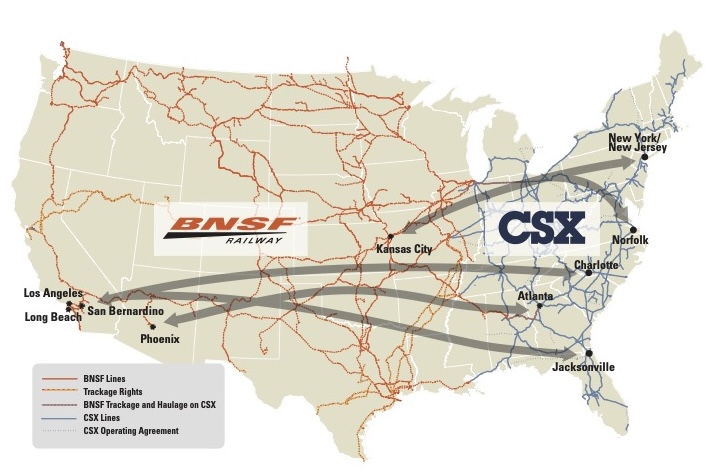
“This collaboration between BNSF and CSX demonstrates the power of partnership, delivering greater flexibility, efficiency, and value for our customers,” Jon Gabriel, BNSF group vice president of consumer products, said in a statement. “We are looking forward to these offerings providing immediate, streamlined service to the supply chain across key markets nationwide.”
Drew Johnson, CSX’s vice president of intermodal sales and marketing, said the joint lanes will create faster and more reliable service. “Together, we’re opening access to key markets and strengthening options for our mutual customers,” he said in a statement.
CSX spokesman Austin Staton said the interline agreement with BNSF is unrelated to the UP-NS merger.
“I can understand why in the current context why people might make that leap. However, let me be clear — this should not be interpreted as a reaction to anything. This is simply two railroads working together as we work together all the time and is no different than our SMX announcement in July,” he said, referring to the joint Southeast-Mexico service launched with Canadian Pacific Kansas City through their new interchange at Myrtlewood, Ala. “Interline agreements like this are common, and we’ve worked on this particular agreement for many months.”
Analysts widely believe that a BNSF-CSX merger is the inevitable competitive response to UP-NS.
But the Surface Transportation Board’s tougher 2001 federal merger review rules note that joint marketing agreements and interline partnerships can produce merger-like efficiencies without the risk of integration-related service meltdowns like those that accompanied the UP-Southern Pacific merger and the NS-CSX carve-up of Conrail.
And those rules also say that the board will weigh whether “claimed merger benefits can be achieved through cooperative agreements among carriers short of a merger. Given the size of the transactions with which we may be faced, and the dangers involved should these transactions fail, we will scrutinize claimed merger benefits very closely.”
Joint marketing agreements do not require board review or approval.
BNSF and CSX said the new intermodal service “will offer immediate value for customers by increasing flexibility and optionality, while delivering integrated service for freight moving across the U.S.”
Activist investor Ancora Holdings, in a letter released this week, publicly criticized CSX for not moving faster to find a merger partner. CSX CEO Joe Hinrichs has said the railroad is open to any options that will “deliver value for our shareholders, drive profitable growth, and serve our customers better.”
CSX’s stock initially dropped as much as 9% on the news.
“The only reason CSX’s stock is down is because the market is disappointed the press release is for a CSX collaboration, rather than an acquisition,” says Rick Paterson, an analyst at Loop Capital markets.
The interline service announcement was no surprise, he says.
“The recently announced UP-NS merger proposal has obviously pushed BNSF and CSX into each others’ arms and it’s much easier to collaborate and trust each other when there’s a common enemy,” Paterson says. “This is completely rational and was expected.”
Independent rail analyst Anthony B. Hatch says the interline agreement was “an attempt to prove you don’t need a merger.”
Intermodal analyst Larry Gross says the BNSF-CSX deal should show that railroads can solve the intermodal interchange problem without a merger. “The lanes into the Southeast are long-haul lanes that rightfully should be prime for intermodal. L.A.-Atlanta is 2,200 highway miles,” he says.
“The KC to East Coast offering is interesting because the BNSF portion is relatively short haul,” Gross says. “This has been a key reason why the watershed markets have remained an intermodal hinterland — because the length of haul for one of the players is too short to be interesting. Perhaps this marks a change in that kind of thinking?”
BNSF, a unit of Berkshire Hathaway, has not commented on the UP-NS merger.
The railroads did not provide details on when the new services would start.
The New York/New Jersey and Port of Virginia traffic will be interchanged in Chicago for the trip over BNSF to Kansas City. The domestic cross-country service will rely on the BNSF-CSX interchange at Birmingham, Ala., and BNSF’s haulage rights over CSX to Atlanta.
Note: Story updated at 2:38 p.m. Central with comment from analyst Rick Paterson, at 4:08 p.m. with comment from intermodal analyst Larry Gross, and at 6:07 p.m. with comment from analyst Anthony B. Hatch.






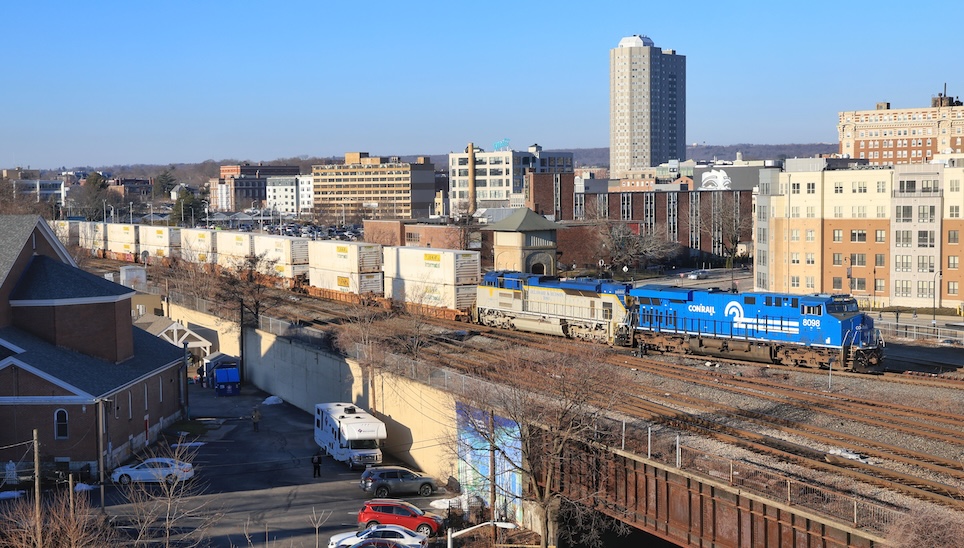

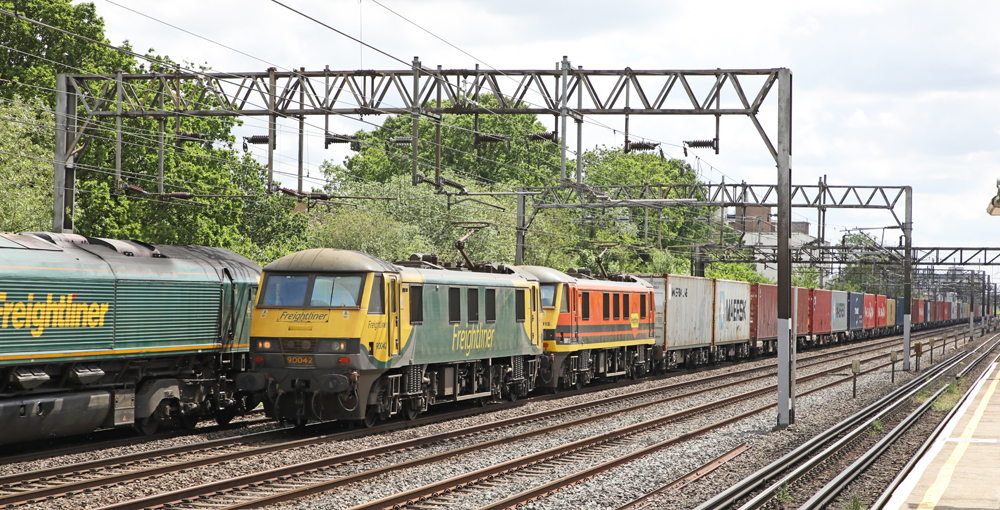
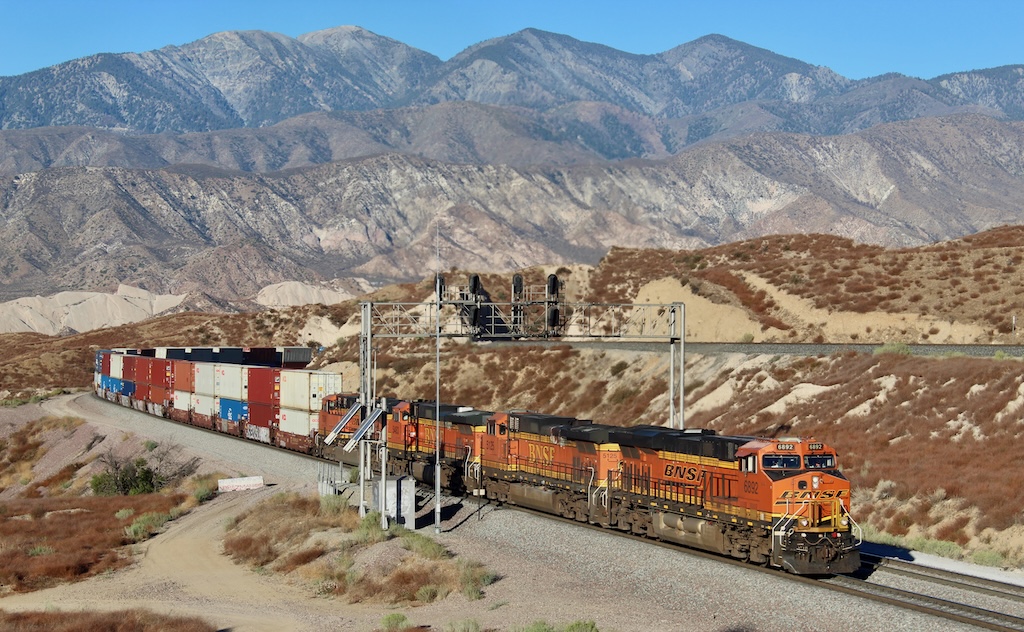




Let them Be If they are delivering the Goods Efficiently and Timely It’s Putting the Merger on the Back Burner and A Watch Pot Never Boils
It matters not what Mr. Sutton of CSX says about this joint intermodal alliance not having anything to do with UP/NS. Anybody as smart as Warren Buffet doesn’t wait around until things happen to react. He is almost anally proactive and probably had conversations with CSX the minute legacy news sources (or internal industrial sources) mentioned that UP and NS were “thinking” about their options. I have mentioned my opinion here several times that BNSF has too much at stake (as reiterated by Mr. Fuller’s comments) in their intermodal business, almost to the point of making everything else secondary, to consider tying things up or potential fluidity issues on its lines to mess around with a merger that they would not have absolute control of. With JB Hunt and now CMA CGM putting their works in the hands of PRIVATELY owned BNSF, they limit the amount of outside interference that others like Ancora and other PREDATORY hedge funds can wreak upon a railroad carrying their containers across the land to negotiations with similar entities, ie, railroads, who have the same knowledge and interests as they do, not just profiting at the expense of everything a railroad stands for. The alliance route gives them all the benefits of a merger (in specific lanes) without the potential hits to their management plans that minority Wall Street funds can do without care for what the long term results are. Yes, Ancora will now threaten Joe Hinrichs with his position and again try to install two time loser Jamie Boychuk and some other puppets on the CSX Board to “tear things down to the studs” and ruin a perfectly good and decently operating railroad (before the hurricanes hit) to force massive lay-offs and cost cutting all to get a sub 60 operating ratio so they can plunder CSX just like they have done or will do to NS. Leopards rarely can change their spots!
In the end, when the STB most likely turns down UP and NS, the same result will occur for them and their customers, an end to end alliance in the same vein. It may not provide all the efficiencies and benefits that a merger may have provided for ALL freight, but it may be just as flexible and not require them to sell off routes or make concessions in the form of trackage rights, etc., to those who just want something for nothing and don’t have the money to get it any other way. OH WELL, and we all know who that is…
The connecting point between the Phoenix Sub and the Transcon is Williams Jct. Are they adding an additional track there?
Just saw a fully loaded express BNSF grain train with DPU routing through on CSX in Thurmond, WVa.
All 3 engines were BNSF, almost all the grain cars (~100) were BNSF.
Don’t know if that is normal, a test run or the service has started. But it was impressive, people around there aren’t used to seeing a BNSF unit grain train that far east.
Run through agreements have been used by the industry for many years, That is probably all it was…
@John Rice: Those are connecting points, and so are not overlaps. In Chicago, Kansas City, and St. Louis, there is district-wide reciprocal switching, so customers have commercial access to all RRs.
Neither Peoria nor Springfield are major points, compared with the above.
@ Jack, you are confusing two things I was highlighting.
Connection points was one, and cities where the 2 overlap and provide service to customers was the other.
BNSF today has 2 Chicago bypasses in Illinois with CSX, one at Smithboro and one at Shattuc. All based on the Beardstown Sub.
BNSF has a connecting track at Smithboro where some Powder River coal drags transit over to CSX St Louis Line the goes to Avon and all points in the northeast US. The diamonds at Shattuc are sitting in the grass waiting for CSX to reactivate the Illinois Sub that runs between East St Louis and Queensgate. Technically BNSF and CSX could interchange traffic coming west from Norfolk if they put the yard bypass track back in at Queensgate so it skips the congested yard full of north-south traffic.,
There is a third connection in Woodlawn, IL off the BNSF Beardstown Sub which is not really a bypass. It’s currently operated by Evansville Western, but CSX owns the tracks and has operating rights on it. If there was southeast traffic to transfer , that would probably be the preferred route as it reaches Nashville quicker. But EVWR has a large amount of coal traffic on that line from all of the Illinois high sulphur coal mines. Demand for this coal is currently off the roof for plants that have scrubbers.
Just keep this in mind when waxing with enthusiasm about i/m: from a recent BNSF earnings call: “50% of our volume. 33% of our revenue.”
That is a great map in the article. Talk about no overlap.
..
Warren just needs to loosen up his purse string and buy CSX. Would be pocket change for how much cash he has sitting around. Heck, could probably use today’s gains on the stock market to buy CSX.
There’s no overlap between UP and NS.
Jack Fuller sez “There’s no overlap between UP and NS.”
Kansas City
St Louis
Peoria
Chicago
Springfield IL
NS has haulage rights on UP (former C&EI) from Sidney, IL down to Salem, IL
If CSX would raise the ceiling on those 2 tunnels in Indiana, they could double the Intermodal with BNSF between East St Louis and Charlotte. At the moment the money is on the former NYC/PRR through congested Avon Yard in Indy.
You’re not routing Charlotte traffic via St Louis.. Memphis will always be the better interline from a mileage standpoint. UP/NS already have the advantage here via Shreveport.
A combined UP-NS would own four sevenths of TRRA, the connection of the Class 1s at St. Louis, leaving BNSF, CSX, and CN with the remaining three sevenths, not an attractive option for interchange.
Braden:
Shreveport is currently self-limited as a gateway due to the impasse created between CPKC not wanting foreign trains longer than 8,000 ft. on the speedway AND UP / NS’s unwillingness to run extra trains that are under 8,000 ft… so most traffic goes through Memphis for them, too.